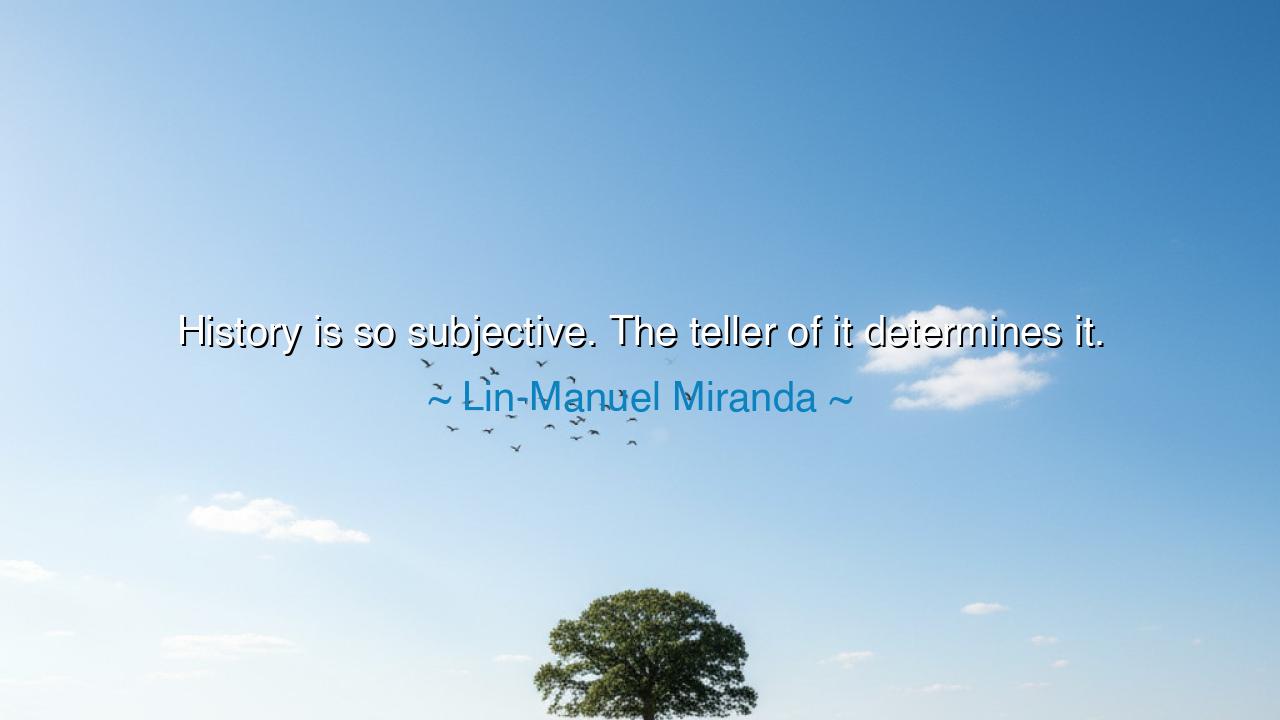
History is so subjective. The teller of it determines it.






“History is so subjective. The teller of it determines it.” – Lin-Manuel Miranda
Thus spoke Lin-Manuel Miranda, the poet of the stage and the modern bard of the republic, whose art has breathed new life into the stories of old. In these few words, he unveils a truth both ancient and unsettling: that history, the record of what was, is not fixed stone, but living clay. It is shaped by the hands of those who tell it, molded by their voices, their values, their vision. He reminds us that what we call “the past” is not merely a collection of facts—it is story, and every story has a storyteller. The way we remember determines the world we build, for the past is the root from which the future grows.
The origin of this insight lies not only in Miranda’s intellect, but in his craft. As the creator of Hamilton, he reimagined the founding of the United States through the rhythms of hip-hop and the faces of a diverse cast. In doing so, he demonstrated that history is not a sacred relic locked away from new voices—it is a living dialogue. By retelling the story of Alexander Hamilton, Miranda did not distort history; he revealed it anew, showing how perspective changes understanding. The teller shapes which heroes rise, which deeds are remembered, which lessons endure. Thus, he teaches that history’s subjectivity is both its danger and its beauty: danger, because it can be used to deceive; beauty, because it allows each generation to rediscover truth through its own eyes.
For as long as men have walked the earth, history has belonged to those with the power to speak. The victors write their triumphs in golden ink, while the fallen are buried beneath silence. Empires rise upon the stories they tell of their glory, while the oppressed fade into the footnotes. Consider the conquest of the Americas: to the colonizer, it was discovery; to the native, it was devastation. The same event, two histories—one sung in celebration, the other whispered in grief. Miranda’s words call us to remember that no history is whole unless it listens to every voice, including those long ignored. The teller determines it, and so it is the sacred duty of each age to choose its tellers wisely.
There is an ancient example that shines with this same truth: the Battle of Thermopylae, where the Spartans fell against Persia. For centuries, the tale has been told as one of valor and sacrifice, of freedom standing against tyranny. Yet, who wrote that tale? The Greeks themselves. In the Persian accounts, the story was different—a tale of imperial might and the futility of resistance. Both saw themselves as right, both believed themselves noble. And so, even in antiquity, the truth of history depended not only on what happened, but on who spoke. This is what Miranda echoes: that history is not a mirror reflecting reality, but a lens shaped by the hand that holds it.
Yet Miranda’s reflection is not cynical—it is empowering. He does not warn us away from history; he invites us to reclaim it. If the teller determines the tale, then let new tellers arise. Let the silenced find their voice, the forgotten be remembered, the misunderstood be re-seen. His work reminds us that every generation must rewrite history, not to change the facts, but to uncover the fullness of truth. For when only one voice speaks, history becomes propaganda; but when many speak, it becomes human.
Thus, we see that the subjectivity of history is not a flaw to be feared, but a reminder of our responsibility. We must be vigilant storytellers, seekers of perspective, questioners of authority. When we hear a tale of the past, we must ask: Who told this story, and who could not? When we teach, we must strive to include all who lived it. For as Miranda teaches, history is a living conversation between past and present. It is not merely about what was, but about what we choose to remember.
So, my child of the future, take this teaching into your heart: be a teller of truth. When you speak of history, speak with compassion for the unseen, with courage to challenge the known, and with humility to accept that no telling is final. Add your voice to the great chorus of time, not to erase the old songs, but to harmonize with them. For history is not the domain of kings and scholars alone—it belongs to all who dare to remember. As Lin-Manuel Miranda reminds us, the power to tell the story is the power to shape the world, and every voice that rises with honesty brings humanity one step closer to truth.






AAdministratorAdministrator
Welcome, honored guests. Please leave a comment, we will respond soon